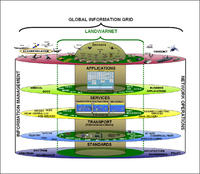-
New material to improve efficiency of power grids
Global energy demand is on the rise, as populations continue to grow and industrialization progresses; at the same time, there is a growing awareness and concern about repercussions of increasing rates of carbon dioxide emissions released in the atmosphere; a new nanocomposite material holds the promise of enabling smarter, more reliable, and greener power systems
-
-
Infrastructure security, disaster planning “Super map” developed

A U.S. Marine stationed at the Quantico base in Virginia has developed sophisticated mapping software that can give users full situational awareness of their surroundings in real-time; the software is a “super map” taking in a torrent of data streams from emergency dispatch reports to weather forecasts, traffic reports, and security system alerts
-
-
If Japan-like disaster happened in U.S., results would be far worse
An estimated 20,000 people died or are still missing after a massive earthquake-induced tsunami struck Japan on 11 March 2011, yet some 200,000 people were in the inundation zone at the time; experts say that if the same magnitude earthquake and tsunami hits the Pacific Northwest, the death toll will be much higher because of the lack of comparable preparation; that 90 percent rate could be the number of victims, not survivors
-
-
Industry: current chemical safety standards sufficient, should be extended
DHS’s management of the U.S. chemical plant safety has come under criticism lately, but he Society of Chemical Manufactures and Affiliates (SOCMA) said it strongly supports U.S. chemical security standards; the industry associated noted that since the program’s 2007 launch, more than 2,000 facilities have changed processes or inventories such that they are no longer considered high-risk under the Chemical Facility Anti-Terrorism Standards (CFATS)
-
-
Critics: current chemical safety standards insufficient, should not be extended
Critics of the current chemical plant safety standards say these standard are insufficient and should be extended; critics cite EPA data to highlight the fact that current safety standards leave more than 110 million Americans at risk from high-risk chemical plants
-
-
Top LulzSec hackers arrested, leader turns them in
In the ongoing battle between law enforcement officials and hackers, authorities announced on Tuesday that they had arrested leading members of the hacktivist group known as LulzSec after their leader allegedly turned them in
-
-
Solving the major problem of renewable energy: intermittency
Intermittency, sometimes called the Achilles’ heel of renewable energy, has so far limited the penetration of renewable sources in most power grids; engineers imagine an energy future where giant transmission grids are backed up by massive energy storage units
-
-
National Weather Service budget cuts threaten poor IT infrastructure

The Obama administration has proposed cutting more than $39 million from the National Weather Service’s (NWS) budget, particularly from its IT department, and critics worry that the cuts could cause the agency’s already crippling infrastructure problems to grow worse
-
-
Increase in groundwater demands due to climate change
As precipitation becomes less frequent due to climate change, lake and reservoir levels will drop and people will increasingly turn to groundwater for agricultural, industrial, and drinking water needs; the resource accounts for nearly half of all drinking water worldwide, but recharges at a much slower rate than aboveground water sources and in many cases is nonrenewable
-
-
NSA pushes for greater federal cybersecurity role
General Keith Alexander, the head of the National Security Agency (NSA), and other intelligence officials are pushing the Obama administration to expand the role of the NSA in federal cybersecurity initiatives
-
-
Senators compete over critical infrastructure cybersecurity bill
Lawmakers are currently struggling to come to a consensus on which government agency should be in charge of securing the nation’s cyber infrastructure
-
-
AlertEnteprises wins three awards for critical infrastructure security tech
Last week AlertEnterprise announced that it had been given three awards for its identity and access management technology used to help secure critical infrastructure
-
-
Poultry feathers-based filters remove arsenic from water
Thousands of people die each year in developing countries from drinking arsenic-contaminated water; researchers develop inexpensive filters made from the modified protein (keratin) in poultry feathers to remove arsenic from drinking water
-
-
Energy from differences between salt- and fresh water – produced inland
Production of energy from the difference between salt water and fresh water is most convenient near the oceans, but now, using an ammonium bicarbonate salt solution, researchers can combine bacterial degradation of waste water with energy extracted from the salt-water fresh-water gradient to produce power anywhere
-
-
What U.S. can learn from EU chemicals law
U.S. industry and environmental groups agree that the Toxic Substances Control Act of 1976 needs to be modernized better to protect public health and the environment; there is no consensus, however, on what the reform should look like; researchers suggest that the United States may want to look at how the EU regulates chemicals
-
More headlines
The long view
Water Wars: A Historic Agreement Between Mexico and US Is Ramping Up Border Tension
As climate change drives rising temperatures and changes in rainfall, Mexico and the US are in the middle of a conflict over water, putting an additional strain on their relationship. Partly due to constant droughts, Mexico has struggled to maintain its water deliveries for much of the last 25 years, deliveries to which it is obligated by a 1944 water-sharing agreement between the two countries.
Trump Is Fast-Tracking New Coal Mines — Even When They Don’t Make Economic Sense
In Appalachian Tennessee, mines shut down and couldn’t pay their debts. Now a new one is opening under the guise of an “energy emergency.”
Smaller Nuclear Reactors Spark Renewed Interest in a Once-Shunned Energy Source
In the past two years, half the states have taken action to promote nuclear power, from creating nuclear task forces to integrating nuclear into long-term energy plans.
Keeping the Lights on with Nuclear Waste: Radiochemistry Transforms Nuclear Waste into Strategic Materials
How UNLV radiochemistry is pioneering the future of energy in the Southwest by salvaging strategic materials from nuclear dumps –and making it safe.
Model Predicts Long-Term Effects of Nuclear Waste on Underground Disposal Systems
The simulations matched results from an underground lab experiment in Switzerland, suggesting modeling could be used to validate the safety of nuclear disposal sites.
